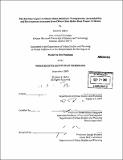The Bui Dam impact on Ghana-China relations : transparency, accountability and development outcomes from China's Sino Hydro Dam Project in Ghana
Author(s)
Habia, James K
DownloadFull printable version (12.08Mb)
Alternative title
Transparency, accountability and development outcomes from China's Sino Hydro Dam Project in Ghana
Other Contributors
Massachusetts Institute of Technology. Dept. of Urban Studies and Planning.
Advisor
Balakrishnan Rajagopal.
Terms of use
Metadata
Show full item recordAbstract
The current Afro-Chinese relations on development projects in Sub Saharan Africa has come under a lot of scrutiny, with some experts in the South-to-South relationship discourse claiming the above short-gun-marriage will hurt Africa in the long run while other experts and African leaders believe it is the best strategy to help Sub Saharan Africa develop economically and infrastructure wise. This thesis examines the Bui hydroelectric dam project, which is currently under construction in Ghana by Sino Hydro (Chinese Company), with financing coming from the Chinese government through the Exim Bank of China. It compares how the Akosombo that was financed by the World Bank in the 1960s handled the social and physical ramifications caused by the project, and how Sino Hydro is approaching the same issues that will be created by the Bui dam project. It reveals that the government of Ghana and the Bui Power Authority were very careful about the planning process they adopted to ensure that displacement and resettlement on the project site was handled professionally by Sino Hydro to ensure the smooth running of the project. They applied International Financial Corporation's (IFC-P7) standard on large development projects, even though the Bui dam was being constructed and financed by China. Supporting the fact in order for Africans to benefit from the Afro-Chinese relations, they have to ensure that the proper structures are in place before negotiating contracts that will result in a win-win outcome with the Chinese, and how these structures are still heavily influenced by the Northern standards.
Description
Thesis (M.C.P.)--Massachusetts Institute of Technology, Dept. of Urban Studies and Planning, 2009. "September 2009." Cataloged from PDF version of thesis. Includes bibliographical references (p. 132-133).
Date issued
2009Department
Massachusetts Institute of Technology. Department of Urban Studies and PlanningPublisher
Massachusetts Institute of Technology
Keywords
Urban Studies and Planning.